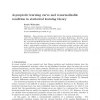Free Online Productivity Tools
i2Speak
i2Symbol
i2OCR
iTex2Img
iWeb2Print
iWeb2Shot
i2Type
iPdf2Split
iPdf2Merge
i2Bopomofo
i2Arabic
i2Style
i2Image
i2PDF
iLatex2Rtf
Sci2ools
CORR
2010
Springer
2010
Springer
Asymptotic Learning Curve and Renormalizable Condition in Statistical Learning Theory
Bayes statistics and statistical physics have the common mathematical structure, where the log likelihood function corresponds to the random Hamiltonian. Recently, it was discovered that the asymptotic learning curves in Bayes estimation are subject to a universal law, even if the log likelihood function can not be approximated by any quadratic form. However, it is left unknown what mathematical property ensures such a universal law. In this paper, we define a renormalizable condition of the statistical estimation problem, and show that, under such a condition, the asymptotic learning curves are ensured to be subject to the universal law, even if the true distribution is unrealizable and singular for a statistical model. Also we study a nonrenormalizable case, in which the learning curves have the different asymptotic behaviors from the universal law.
Asymptotic Learning Curves | Common Mathematical Structure | CORR 2010 | Education | Universal Law |
| Added | 09 Dec 2010 |
| Updated | 09 Dec 2010 |
| Type | Journal |
| Year | 2010 |
| Where | CORR |
| Authors | Sumio Watanabe |
Comments (0)

